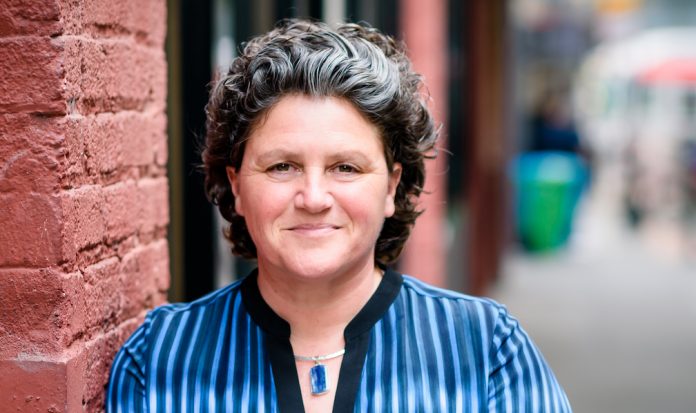[This article appears in the March/April 2020 issue of Boston Spirit magazine. Subscribe for free today.]
For her first job at Fenway Health, back in the early ’90s, Ellen LaPointe volunteered at a fundraising dinner. She was in her early twenties, she recalls, working on her bachelor’s degree in health policy at Brown University, and she came into Boston to help out at the event. To her surprise, her volunteer assignment was to spend the next several hours assisting Fenway’s special event guest, Lily Tomlin.
“It was the best volunteer assignment a girl could ever want,” she told Boston Spirit.
In March, LaPointe comes back to Fenway, this time as CEO. She will lead one of the nation’s foremost health centers for care and research focused on LGBTQIA+ health and HIV/AIDS, where some 500 employees serve over 30,000 clients and deliver ground-breaking, life-saving research that benefits communities worldwide.
“I don’t know of another organization like this,” she said. “It’s a force to be reckoned with. It’s incredibly exciting and such an honor to come back.”
Born and raised in Maine, LaPointe moved to the San Francisco Bay Area 27 years ago for one of her first job opportunities after Brown. She and her family have returned to Maine often, just about every summer, she said. “I thought I’d stay [in the Bay Area] for two years, I really did. I’m a New Englander at heart. But you know what they say, “Life happens when you’re making other plans.” Now she’s moving back East with her wife, and her high-school-age son will join them part-time while he finishes up classes, residing with his other Mom in Berkeley for the rest of his junior and senior year. “This is a major life decision,” LaPointe said, “but in every way I honestly feel like I’ve come home, life has come full circle.”
Democratizing access
What LaPointe is also bringing back to the East Coast is nearly three decades of experience working in, managing and leading life-impacting health care, social justice, research, LGBTQIA+/HIV activism and advocacy organizations. A powerful combination for her new role at Fenway.
Her move to the West Coast coincided with the early days of the AIDS crisis, which, in San Francisco was met with crisis-response activism and compassion like it was in Boston, New York City and other epicenters where the gay and lesbian communities had no choice but to take the lead.
For LaPointe, that began “in the earliest stage, in the late ’80s,” when her work “was oriented around bending some rules for people with HIV to get access to promising AIDS treatment, because at the time the only way that was possible was to go to an academic institution where there were the large federally funded grant programs,” she recalled. Her career moved along with “the birth of the community-based clinical trials movement in the late ’80s and early ’90s, which was essentially an ACT UP movement to get people access to drugs that might save their lives and to help advance what we know. That was completely community driven. It was a grassroots effort, and I was very, very fortunate to be a part of it. We were, I think, very impactful across the country in making that happen. Democratizing access to these treatments.”
Among her many leadership roles, LaPointe served as director of The HIV Cure Initiative, a nonprofit that aims to find a drug-free remission in HIV. She was executive director of Project Inform, the national nonprofit treatment information and advocacy organization. She also served as director of clinical research at Saint Francis Memorial Hospital in San Francisco, one of her first jobs after moving to the opposite coast.
Another standout role was as vice president for strategic initiatives and then strategic partnerships at HopeLabs, a nonprofit created by the eBay-founding Omidyar family “to harness the power of technology to promote positive health behaviors in young people,” LaPointe described.
“The way I got there was because the woman who had been running the San Francisco AIDS Foundation [reached out to me]—a woman named Pat Christen, who herself had a major role in some of the earliest and most important public policy that’s happened in HIV—one of the architects of the San Francisco Care Model—she and I had a close working relationship for a long time,” she said.
LaPointe comes to Fenway directly from serving as president and CEO of Northern California Grantmakers in San Francisco, “a nonprofit that brings together Bay Area philanthropy to advance the common good,” as Fenway Focus describes it.
A collaborative mindset
“What I would hope folks will come to see and know and understand about me is that I truly am at my core a connector,” said LaPointe. “I’m very committed to making sure that we are engaged, authentically, as an organization, with the community that we serve.” She hopes to build on the strong relationships that Fenway has worked hard to create with its clients, within the organization, and with partners—from LGBTQ+ groups big and small, to large institutions like hospitals and other neighbors, she said. “Because at the end of the day, we all want the same thing. We all want to live our best lives and we all want to be well and healthy.”
“I think people can expect that I’ll do a lot of listening, that I will approach things through a very collaborative mindset,” she adds. “I think they can expect that Fenway Health will continue to evolve along the same general pathways that it has been on for so long and so well.”
“I really do believe that we do our best work when we feel respected and we feel seen and heard,” she said. “And we take the time to celebrate and appreciate one another, even as we’re driving very hard together in pursuit of the things that we care about deeply.”
Not a subscriber? Sign up today for a free subscription to Boston Spirit magazine, New England’s premier LGBT magazine. We will send you a copy of Boston Spirit 6 times per year and we never sell/rent our subscriber information. Click HERE to sign up!










